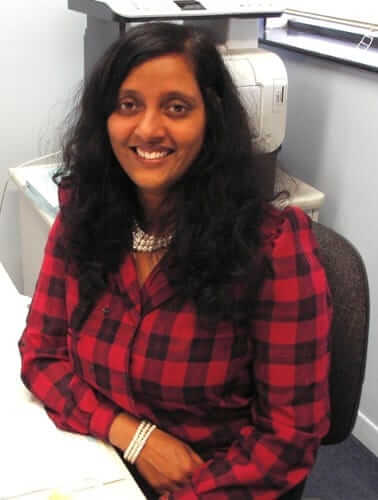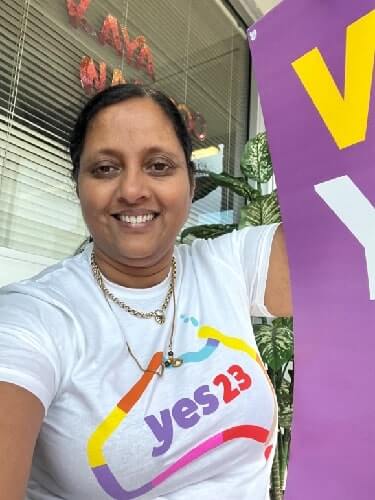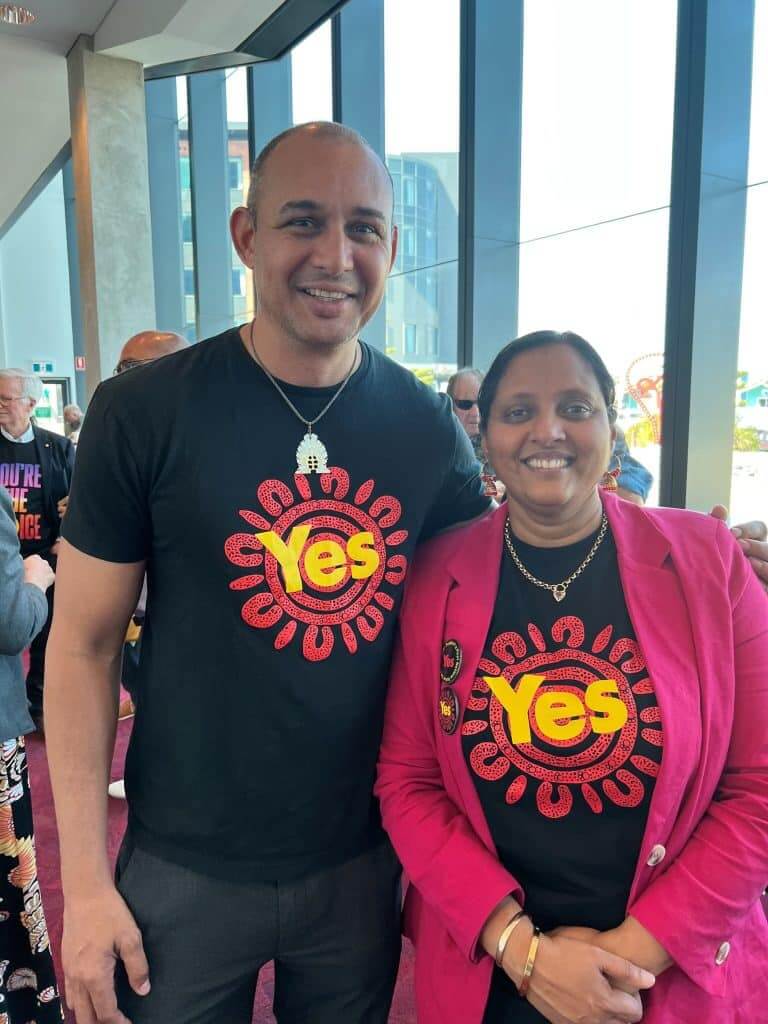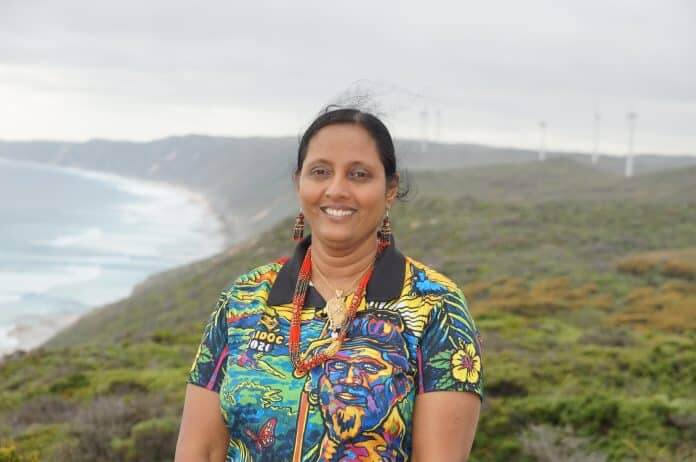Asha Bhat is getting used to being called ‘Moorditj yorga’.
It means ‘Strong Woman’ in the language of the Noongar people of Western Australia.
Her latest award proves she is indeed a Moorditj Yorga. Asha Bhat, the CEO of Southern Aboriginal Corporation SAC, has just been announced as the winner, in her state, of the 2024 Australian Awards for Excellence in Women’s Leadership.
She is recognised for her commitment to social justice and human rights, having made significant impact in the lives of women and marginalised communities, through her work at the SAC.
Founded in 1983, the SAC represents the interests of the Noongar people of southwest WA. Living in small isolated communities then, the SAC has been able to speak for them as one.
The organisation has flourished under Bhat’s 17-year tenure, 11 of these as CEO, and six as Finance Officer.
“A passion for social justice and equality has brought me to Indigenous affairs,” Bhat told Indian Link. “Since taking over as leader at the SAC, this passion has only grown further. I have seen and understood the injustice and the disparity, and it motivates me to work towards upholding the rights of Indigenous people who have been marginalised and oppressed.”

Her work at first was to rebuild a floundering organisation. Today, the range of the activities at SAC has grown tremendously – including housing, domestic violence, health, and environmental protection. Each of these sectors in itself is multi-pronged, with highly structured activities in each; for eg, in the health vertical alone, there are programs for legal assistance, counselling, advocacy, community legal education.
Developing strategy could not have been simple.
“It wasn’t easy, both at the strategic and at the operational levels,” Bhat admitted. “The different portfolios together provide integrated service delivery. Each of our (verticals) are social determinants; when it comes to employment or family violence or suicide – they’re all interconnected. So it hasn’t been easy. Sometimes, you go from big policy reform in one area to another, and that can be difficult again. Plus, each program has its own bunch of professionals so that makes it complex too. Yet, years of experience to understand the issues involved, and years of experience in building rapport with the Aboriginal people, have helped.”
Bhat is particularly conscious about supporting “self-determined and Aboriginal-led solutions”, and “implementing a culturally informed trauma integrated healing approach”.
“This is very important in our decision making,” Bhat elaborated. “Our clients are impacted by trauma. And then we’re dealing with intergenerational trauma, such as Stolen Generation. So, it’s very important in our work to understand trauma from a variety of standpoints, including the colonisation point of view. One important way to do that is to make sure that every decision we make is determined by Aboriginal people, for Aboriginal people. I am merely about providing business expertise, administrative expertise and financial expertise.” Asha Bhat Awarded
While there is consultation, that itself could be an issue. “Aboriginal people can be over consulted,” Bhat revealed. “Every time we get funding, the goalpost changes. That means we have to go back to the community and consult with them again and again, and it’s not easy. It’s not easy for them either. And many a time consultation goes without rewarding them for their cultural knowledge – it’s just taken for granted. It costs them – to be donating their cultural time, while donating their cultural knowledge. So that’s another thing I’ve implemented within the organisation – to make sure that every person who has donated time for us, is acknowledged and rewarded.”

It’s clear that keeping people front and centre is vital to Bhat’s style of leadership.
With nearly twenty years of work in Aboriginal communities, what is that one achievement that she looks upon with pride?
“One of my proudest achievements has been in spearheading initiatives to provide better access to the justice system for Aboriginal victims of violence. By advocating for critical legal, housing, and other support services, I have helped to create pathways to safety and stability for those fleeing abuse. Through partnerships with government agencies and non-profit organisations, I have worked tirelessly to expand access to vital resources and support networks.
Yet she added, “Looking back, I feel I could have done better in my early years as a leader, if I had guidance and/or mentors then. Perhaps I had way too many honest conversations in my long sittings with clients and staff! But I learned important lessons from that.”
Another thing Asha Bhat could have done differently, she added wistfully, is to seek greater work-life balance. “My son was very young as I started. I didn’t go to even one school assembly. I wish I could change that – and perhaps I will, with the grandkids. Now, when staff ask for time to go to see their child get an award or some such, I’m the first person to say, ‘please go!’”. Asha Bhat Awarded
Am yet to come to terms with referendum results. During the campaign, I went through a lot of racist comments – Indian go back to your country, don’t have brains, you are smart so don’t work for First Nations people and many more.
Australia we should do better. Stop Racism
pic.twitter.com/10nzjLcNxb
— Asha Bhat OAM (@asha_bha) October 22, 2023
A Bangalore girl, Bhat has spoken often about how her own Indian background has helped in her role as leader.
“As a migrant, I have faced my fair share of challenges, but it is my belief in the inherent worth and dignity of every individual that has guided me through even the darkest of times. My Indian ethnicity particularly, has helped me understand the interconnectedness in culture, the impact of social contact, understanding the family structure, the value of shared knowledge, and of preservation of culture, as well as the impact of colonisation. It’s helped me understand the laws of this society and to think through that and act that way.”

Perhaps it was these aspects that saw great support in the Indian community for Voice in last year’s Referendum. It brought out that we do care deeply about reconciliation and about seeing upliftment in this section of Australia.
Bhat agreed but noted, “We need to engage more deeply, and I’m beginning to see that in WA now. The Indian Society of Western Australia has some wonderful programs in this regard.” Asha Bhat Awarded
Ask her what she herself has learned from Aboriginal culture, and Asha Bhat responds unhesitatingly, “Resilience in the face of adversity.”
Just like her name, which means hope, we are sure Asha, Moorditj yorga, is going to shine on with optimism for the people she works for, and the people she works with.
Read more: Professor Kuntala Lahiri-Dutt, AO: Australia Day Honours 2024




